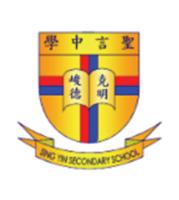| Language Policy |
From F.1 to F.6, students learn most subjects through English. |
| Learning and Teaching Strategies |
Curriculum development is based on the idea of whole person development and allowing students to choose subjects that suit their attitude and aptitude. All F.1 to F.6 students have to study Religious and Moral Education for two periods per cycle. F.4 students have to take three elective subjects. Indeed, our F.4 students have many subject combinations to choose from. Besides the formal curriculum, we also organise sports days, swimming galas, sports competitions of all sorts, music contest, instrumental music classes, sports training courses and social service activities, so students can develop in a suitable area of education. We also encourage students to take part in some religious activities to enhance their knowledge about Catholicism. For many years, we have been providing study rooms and running study skill courses to help students "learn how to learn". |
| School-based curriculum |
1. Electives: 3X. Details will be provided in F.3.<br> 2. Curriculum highlights: Study skills courses are arranged to suit the needs of students in different forms. |
| Approach to Catering for Learner Diversity |
The Guidance Department, the Student Support Team, Social Worker, Educational Psychologist and class teachers work together and take care of students who might need help. |
| Approach to Integrated Education |
The school is committed to building an inclusive and caring campus. With a Whole School Approach, it supports students with special educational needs by providing them with appropriate and diversified support services to enhance their learning effectiveness. The Student Support Team includes Special Educational Needs Coordinator, Head of Guidance Department, teachers who have received special education training and a teaching assistant. Two school social workers and an educational psychologist provide professional assistance to the school and the students. The psychologist provides teachers with training to support students with special educational needs.<br><br>The school has a flexible use of the Learning Support Grant to recruit a teaching assistant and purchase professional services (such as speech therapy and occupational therapy). The school also provides special examination arrangement for students in need. The school also provides assessment, referral and individual education plan for students with serious special learning needs, and helps students learn through interdisciplinary cooperation.<br><br>The school attaches great importance to home-school cooperation in supporting students. The speech therapist will also provide parents with professional advice to help improve students’ speech abilities at home. |
| Education Support for Non-Chinese Speaking (NCS) Students |
|
| Home-School Co-operation |
We have established the Parent-Teacher Association since 1998. The cooperation between us is continuous. |
| School Ethos |
We adopt an authoritative, whole-school approach to guide our students. The Guidance Department runs many programmes such as the "Sing Yin Pioneers" to help junior form students. For discipline, we have four prefect teams to develop students' leadership and self-discipline. Our students are expected to follow the school rules strictly, so our students are well behaved. |
| School Development Plan |
The major concern of this school year is "the Five Core Values of Catholic Education". |
| Teacher Professional Training and Development |
We encourage teachers to further their studies; those who do may receive a subsidy. |
| Life-wide Learning |
We offer about 60 clubs and organisations. Every student must join at least one club. The clubs are run by students and teachers serve only as advisers. |
